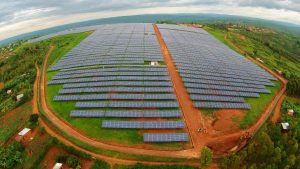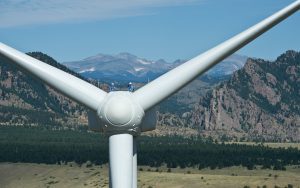The clean energy sector has rapidly transformed the workforce worldwide by creating millions of new jobs and driving economic growth in recent decades. With a focus on renewable, non-polluting sources of power, this sector is reshaping industries and boosting local economies. Careers in clean energy are expanding and offer today’s students exciting educational and career opportunities.

What is the Clean Energy Sector?
At its core, the clean energy sector focuses on generating power from renewable, environmentally-friendly sources that don’t pollute the atmosphere. The goal is to replace fossil fuels with sustainable energy options that limit greenhouse gas emissions. Technologies like solar, wind, hydroelectric, and geothermal energy are extremely important as we strive as a global community to limit global warming to 1.5°C by 2100. Clean energy is doing more than just benefiting the planet—it’s also providing a significant boost to the economy.
Investments in Clean Energy are Stimulating the U.S. Economy
Investing in clean energy is a key driver of economic growth in the U.S. The global market for renewable energy technologies and innovations is expected to reach at least $23 trillion by 2030. This growing demand is opening up new opportunities here at home, as the U.S. strives to be competitive in the global market for the design, manufacturing, and deployment of renewable energy technologies.
Additionally, the U.S. Dept of Energy is working across both the public and private sectors to speed up the U.S. transition to clean energy. With more than $97 billion in investments, the U.S. is expected to see:
- investments in energy-efficient buildings
- advancements in carbon management technology and infrastructure
- development of new transmission lines for cleaner, more affordable electricity
- expansion of energy storage projects
- growth in domestic manufacturing and shorter supply chains
- increased funding for clean energy scientists and researchers
Clean Energy Jobs on the Rise in the U.S. and Canada
 As demand for clean energy increases, it’s creating a wealth of job opportunities, particularly in areas like solar farms, wind turbines, and electric vehicle (EV) charging stations.
As demand for clean energy increases, it’s creating a wealth of job opportunities, particularly in areas like solar farms, wind turbines, and electric vehicle (EV) charging stations.
According to the U.S. Energy and Employment Report (USEER), clean energy jobs have grown by 400,000, a 12.8 percent increase since 2020. The 2024 USEER also shows that the clean energy workforce overall added 149,000 jobs in 2023 accounting for 59 percent of new energy sector employment.
Canada’s Environmental and Clean Technology Sector (ECT) has also been experiencing growth as they work towards a net-zero carbon goal by 2050. The ECT sector created over 300,000 new clean energy jobs in 2021. Clean Energy Canada also estimates that jobs in the clean energy sector will continue to grow by 3.4 percent annually over the next decade.
Renewable Energy Workforce Around the World
Successfully decreasing global greenhouse gas emissions requires the participation of countries all around the planet. Globally, clean energy sectors have added nearly 2.5 million clean energy jobs in 2023, bringing total employment in the sector to 67 million worldwide. Solar energy continues to lead in clean energy employment, followed by EV manufacturing and wind energy. Countries embracing clean energy transitions are seeing impressive employment growth, with clean energy jobs accounting for 10 percent of total job growth in China and 4 to 6 percent in the U.S., European Union, and Japan in 2023.
To achieve net-zero emissions by 2050, the International Energy Agency estimates that 30 million clean energy jobs will need to be created, over half of which will require specialized education and training.
Educational Pathways into the Clean Energy Sector
 Teaching renewable energy in K-12 classrooms is essential for providing students with the knowledge and inspiration to pursue careers in these vital and growing energy fields.
Teaching renewable energy in K-12 classrooms is essential for providing students with the knowledge and inspiration to pursue careers in these vital and growing energy fields.
Students interested in either a traditional university degree or a hands-on certification can find a wide range of options. Colleges across the country now offer numerous clean energy degrees and certifications, particularly in fields like Energy Engineering, Environmental Policy and Management, and Renewable Energy Technology. These programs include diverse courses, such as Energy Economics and Finance, Thermal Systems Engineering, and Green Combustion, to equip students with the skills needed to contribute to the global clean energy transition.
Energy of the Future
The clean energy sector is doing more than just tackling climate change—it’s fueling economic growth and transforming the global workforce. Through job creation, infrastructure investment, and technological innovation, clean energy is reshaping economies and paving the way for new educational and career opportunities. As clean energy jobs continue to grow, the future looks promising—for both the planet and the global economy.
Image credits: Solar field at the Aghozo Shalom Youth Village in Rwanda (Solar Rwanda by Sameer Halai/Power Africa from the GPA Photo Archive is licensed under CC BY-NC 4.0); Wind turbine technicians (National Wind Technology Center Aerial by Dennis Schroeder/NREL from the GPA Photo Archive is licensed under CC BY-NC 2.0); Students in the renewable energy lab at the African Center of Excellence in Energy and Sustainable Development (First year Master’s students by Kelley Lynch/World Bank from the World Bank Photo Collection is licensed under CC BY-NC-ND 2.0)


